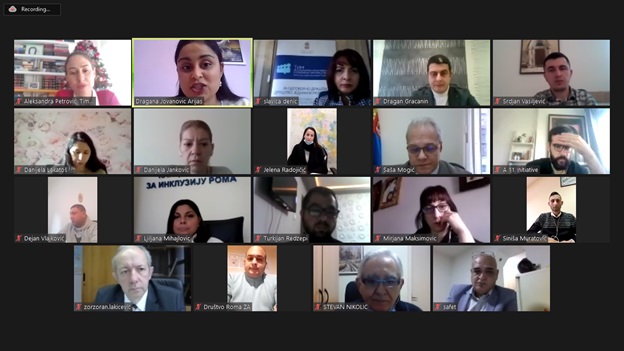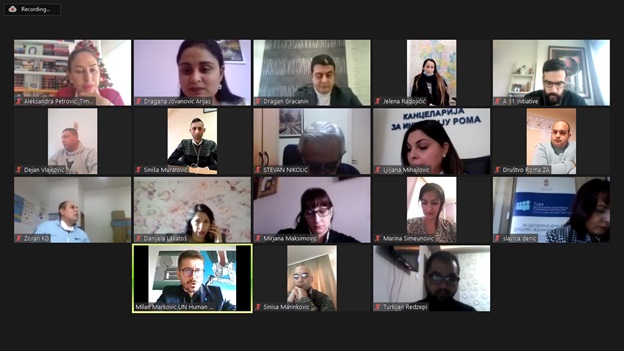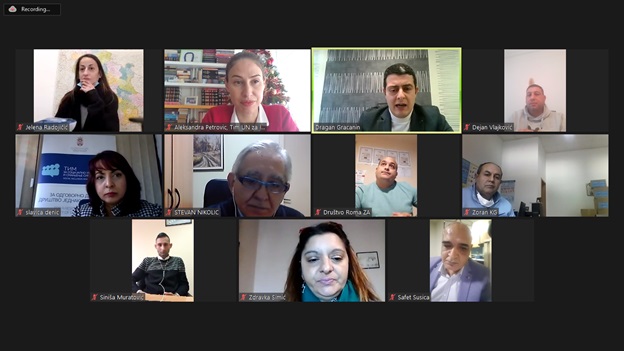 The Social Inclusion and Poverty Reduction Unit of the Government of the Republic of Serbia and the United Nations Human Rights Unit, with the support of the Office of the UN High Commissioner for Human Rights (OHCHR), held an online workshop on 21 December 2020 under the title “Drafting recommendations for recovery and prevention of future risk for the population of the most vulnerable substandard Roma settlements in the Republic of Serbia”.
The Social Inclusion and Poverty Reduction Unit of the Government of the Republic of Serbia and the United Nations Human Rights Unit, with the support of the Office of the UN High Commissioner for Human Rights (OHCHR), held an online workshop on 21 December 2020 under the title “Drafting recommendations for recovery and prevention of future risk for the population of the most vulnerable substandard Roma settlements in the Republic of Serbia”.
The workshop, gathering 50 participants, representatives of state institutions, local self-government units, international organisations and civil society organisations, represents a continuation of joint work under the implemented study “Mapping of substandard Roma settlements by risk and access to rights in the Republic of Serbia, with a particular reflection on the COVID-19 epidemic“, presented on 30 November 2020.
Saša Mogić, Assistant Minister at the Ministry of Public Administration and Local Self-Government stated that the improvement of the quality of life in substandard Roma settlements across Serbia represents an extremely big challenge. “This is a complex problem and we all have the task, through joint efforts, to envisage a durable method of providing care for the population of these settlements in locations that would have proper living conditions”, assessed Mogić, noting the Ministry can be a bridge between state bodies and local self-government units in the process of finding systematic and long-term solutions for this problem.
State Secretary at the Ministry of Mining and Energy Zoran Lakićević noted that this process must be resolved in a systematic manner, and that the aim of the Government of the Republic of Serbia is for Roma to be fully included in society. “Serbia has drafted a database of substandard Roma settlements that provides us with insight into the conditions in nearly 600 settlements. However, the role of local self-government units is extremely important, and they include extremely successful ones in the implementation of initiatives under programmes aimed at improving the status of the Roma community, such as Odžaci or Novi Pazar”, assessed Lakićević and noted that a systematic approach to connecting substandard settlements to the electrical supply network must be resolved in partnership with the Elektroprivreda Srbije power company.
 Milan Marković from the United Nations Human Rights Unit in Serbia recalled that the mapping was implemented with the idea of providing assistance for the systematic improvement of living standards in substandard settlements, but also to create a sustainable dialogue, communication and participation at all levels of authority, as well as the population, to create the capacities to respond to immediate needs, such as water and power. “At the same time it is important to work on long-term solutions that will enable the improvement of living standards in these settlements in accordance with human rights standards for adequate housing”, said Marković.
Milan Marković from the United Nations Human Rights Unit in Serbia recalled that the mapping was implemented with the idea of providing assistance for the systematic improvement of living standards in substandard settlements, but also to create a sustainable dialogue, communication and participation at all levels of authority, as well as the population, to create the capacities to respond to immediate needs, such as water and power. “At the same time it is important to work on long-term solutions that will enable the improvement of living standards in these settlements in accordance with human rights standards for adequate housing”, said Marković.
The President of the Association of Coordinators for Roma Affairs, Dragan Gračanin, noted the workshop represents a follow-up to the joint work of the Social Inclusion and Poverty Reduction Unit of the Government of the Republic of Serbia and the United Nations Human Rights Unit, as well as local mechanisms and civil society organisations. “The role of the workshop is to define recommendations for recovery and the prevention of future risks based on the data obtained, while the aim is to find ways that will make the data available to all and useful for work, and to establish a method for continuous data updates. We need to work together on drafting recommendations and identifying all those competent for their implementation at the national and local level, financial support, and full inclusion of all stakeholders”, explained Gračanin.
The workshop had three thematic units. The first part was dedicated to recommendations on securing the availability of data collected through the mapping and its regular updating. Thereafter the workshop discussed urgent and systemic recommendations and solutions regarding access to the right to water and access to electrical power.
In regards to a group of recommendations on the maintenance and updating of the database on substandard Roma settlements, Siniša Marinković, a Roma activist from Belgrade, proposed to unify the data and centralise it under the auspices of a state institution working on human rights, proposing this to be the Ministry for Human and Minority Rights and Social Dialogue. Regarding updating, he assessed, a reliable platform needs to be set up with access by representatives of local self-government units and civil society organisations, to also ensure data review.
According to the opinion of the representative of the Municipaliy of Raška, Srđan Vasiljević, local self-government units should take on an active role in collecting data in the field. He noted that an established methodology needs to be set up for collecting data, and it is important to have in mind the importance of the participation of civil society organisations in this process.
Marina Simeunović, engaged on the Council of Europe programme ROMACTED, also noted the importance of unifying all databases and recalled the meaning of the data collected by healthcare mediators that also need to have a special place in the unified database.
Slavica Denić, Coordinator for the Social Inclusion of Roma of the Social Inclusion and Poverty Reduction Unit of the Government of the Republic of Serbia recalled that the Unit administers and regularly updates a Database for monitoring Roma inclusion measures at the level of cities and municipalities. “The Unit stands available regarding the maintenance of data obtained through mapping, and furthermore, the questionnaire used to update the existing database can be revised so as to cover questions that will enable the updating of mapping data”, said Denić and noted that when speaking of data maintenance, it is recommended to take into consideration the availability of data to representatives of state bodies and the civil sector, so that the data could contribute to improving the current situation.
In this regard, the representative of the Municipality of Kostolac, Barjam Morina, noted that for local self-government units it is particularly important to know who requests the data, since they expect a higher degree of accuracy when the state, and/or a ministry is requesting the data.
 During the part of the workshop focusing on improving the status of water supply, Safet Sušica, the coordinator for Roma Affairs from Prokuplje noted that cisterns and canisters for potable water should be supplied urgently, and that a key systematic recommendation would be for every local self-government unit to draft technical documentation and start resolving this issue in cooperation with donors.
During the part of the workshop focusing on improving the status of water supply, Safet Sušica, the coordinator for Roma Affairs from Prokuplje noted that cisterns and canisters for potable water should be supplied urgently, and that a key systematic recommendation would be for every local self-government unit to draft technical documentation and start resolving this issue in cooperation with donors.
As noted by the representative of the “Društvo Rom” NGO from Zaječar, Miljan Rašić, it is important to establish measures for stopping the water supply for people in these settlements from being cut off, and to design a method for paying the water bill in instalments, so as to provide for the maintenance of hygiene during the pandemic. In the longer term, he assessed, a detailed plan needs to be drafted to resolve this issue.
“Now we can work on technical repairs, to resolve water supply issues, but in the long term subsidies need to be secured for municipal activities and a model developed that would be based on good practice examples, for example, for everyone to have a free-of-charge connection providing access to water”, said Srđan Vasiljević.
Roma activist from Novi Pazar Behrami Muhamedje proposed that, in areas where settlements cannot be connected to the public water supply grid, tanks need to be built with water pumps, in accordance with all regulations, providing every household with use of water.
Robert Buiz, from the German organisation GIZ warned that short-term measures can frequently turn into a lasting solution, and that in the formulation of systematic solutions the role of civil society organisations is important, potentially contributing to realising such ideas in the field. According to his recommendation, local self-government units need to network and exchange experiences.
Pedagogical assistant Tanja Đorđević proposed the urgent measure of checking the quality of well water that could be a solution for the problem within a given timeframe.
Aleksandra Petrović from the United Nations Human Rights Unit proposed the development of a platform for all those participating in the process. “A common platform would provide for the exchange of good practice examples, which would be a good starting basis for working on models. The proposal is to develop a single model and to monitor it at certain intervals of time”, said Petrović, noting that urgent measures need to be clearly time-bound, and it is important for the processes of drafting solutions to include those ultimately affected by those solutions.
 Regarding access to electrical power, Turkijan Redžepi, a Roma activist from Niš, stated that due to cooperation at all levels, including civil society organisations, the Elektroprivreda Srbije power company, and the Ministry of Mining and Energy, the Niš settlement of Crvena Zvezda has electrical power. He particularly noted that in the process of drafting an agreement with Elektroprivreda Srbije it is important for the Roma community to be involved in the entire process from the start, since it is important for all sides to know what are the possibilities regarding the acceptance and fulfilment of obligations.
Regarding access to electrical power, Turkijan Redžepi, a Roma activist from Niš, stated that due to cooperation at all levels, including civil society organisations, the Elektroprivreda Srbije power company, and the Ministry of Mining and Energy, the Niš settlement of Crvena Zvezda has electrical power. He particularly noted that in the process of drafting an agreement with Elektroprivreda Srbije it is important for the Roma community to be involved in the entire process from the start, since it is important for all sides to know what are the possibilities regarding the acceptance and fulfilment of obligations.
According to Srđan Vasiljević, the improvement of intersectoral cooperation is very important. “It is particularly important that when exercising the right to financial social assistance it is possible to submit a power bill. This data is automatically sent to local self-governments, and then further to EPS. It would be very useful if this right was promoted in Roma settlements”, said Srđan.
Workshop participants have assessed that for the process of improving living conditions in substandard Roma settlements it is important to secure budget funds at the national and local level, but that political will is also important. It was noted that human resources are highly important, with particular emphasis on the role of mechanisms at the local level, such as coordinators for Roma affairs, pedagogical assistants and healthcare mediators. It was concluded that mechanisms need to be sustainable within the community, and that the population of substandard Roma settlements needs to participate in the decision-making process, and be trained to utilise the resources at their disposal. It was emphasised that existing procedures in this regard need to be simplified as much as possible.
As assessed by Dragana Jovanović Arijas, Manager of the Social Inclusion and Poverty Reduction Unit of the Government of the Republic of Serbia, it is important to establish a balance so that short-term solutions do not cause harm in the longer term. “Funds do not mean much if we do not have the will to cooperate, and throughout the entire process it is necessary not just to define a direction for resolving access to water, power and the sewer system, but also to clearly designate who is responsible for what in this process”, concluded Jovanović Arijas.
 Government of the Republic of Serbia
Government of the Republic of Serbia















 pdf [271 KB]
pdf [271 KB]
Leave a Comment